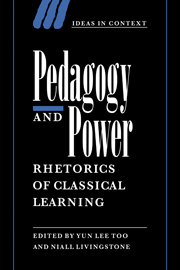Book contents
- Frontmatter
- Contents
- Notes on contributors
- Acknowledgements
- Introduction
- 1 Classics: from discipline in crisis to (multi-)cultural capital
- 2 Schoolboys and gentlemen: classical pedagogy and authority in the English public school
- 3 ‘Die Zung’ ist dieses Schwert': classical tongues and gendered curricula in German schooling to 1908
- 4 ‘What does that argue for us?’: the politics of teaching and political education in late eighteenth-century dialogues
- 5 Women and classical education in the early modern period
- 6 Pilgrimage to Parnassus: local intellectual traditions, humanist education and the cultural geography of sixteenth-century England
- 7 ‘Not so much praise as precept’: Erasmus, panegyric, and the Renaissance art of teaching princes
- 8 Teachers, pupils and imperial power in eleventh-century Byzantium
- 9 Reading power in Roman Greece: the paideia of Dio Chrysostom
- 10 Children, animals, slaves and grammar
- 11 A good man skilled in politics: Quintilian's political theory
- 12 The voice of Isocrates and the dissemination of cultural power
- 13 Xenophon's Cyropaedia: disfiguring the pedagogical state
- Select bibliography
- Index
- IDEAS IN CONTEXT
Introduction
Published online by Cambridge University Press: 30 September 2009
- Frontmatter
- Contents
- Notes on contributors
- Acknowledgements
- Introduction
- 1 Classics: from discipline in crisis to (multi-)cultural capital
- 2 Schoolboys and gentlemen: classical pedagogy and authority in the English public school
- 3 ‘Die Zung’ ist dieses Schwert': classical tongues and gendered curricula in German schooling to 1908
- 4 ‘What does that argue for us?’: the politics of teaching and political education in late eighteenth-century dialogues
- 5 Women and classical education in the early modern period
- 6 Pilgrimage to Parnassus: local intellectual traditions, humanist education and the cultural geography of sixteenth-century England
- 7 ‘Not so much praise as precept’: Erasmus, panegyric, and the Renaissance art of teaching princes
- 8 Teachers, pupils and imperial power in eleventh-century Byzantium
- 9 Reading power in Roman Greece: the paideia of Dio Chrysostom
- 10 Children, animals, slaves and grammar
- 11 A good man skilled in politics: Quintilian's political theory
- 12 The voice of Isocrates and the dissemination of cultural power
- 13 Xenophon's Cyropaedia: disfiguring the pedagogical state
- Select bibliography
- Index
- IDEAS IN CONTEXT
Summary
At the end of the twentieth century telling people that you are a classicist – we mean someone who studies and/or teaches ancient Greek and Latin, and their cultures – is likely to produce a variety of responses. For one of the editors of this volume, being a ‘classicist’ can serve as a form of social camouflage, if a rather odd one. At one end of the spectrum, incomprehension and embarrassed amusement (‘I do Greek’ can be an effective conversation-stopper); at the other extreme, there is the (imagined) recognition of a fellow-member of the club dedicated to preserving ancient (where ‘ancient’ means nineteenth-century) values, traditions and privileges: ‘keep up the good work!’ Different but related is the reaction of the wife of an older (non-classicist) male academic: ‘a Greats man! You must be clever!’ The other editor of this volume has provoked puzzlement, incredulity, discomfort. She has been asked if ‘classics’ is to be understood in its ‘normal’ sense (she wonders what they regard as ‘normal’); if she does ‘classics’ in an ‘extended’ sense (she wonders in turn if ‘extended’ denotes Penguin Classics, and the classics of English literature); or if she does ballet or music. She has also been told on more than one occasion that it is a pity that she does not do her own languages (but she asks herself to whom can Greek and Latin actually belong).
What makes one of us more readily accepted as a classicist than the other?
- Type
- Chapter
- Information
- Pedagogy and PowerRhetorics of Classical Learning, pp. 1 - 15Publisher: Cambridge University PressPrint publication year: 1998
- 1
- Cited by

